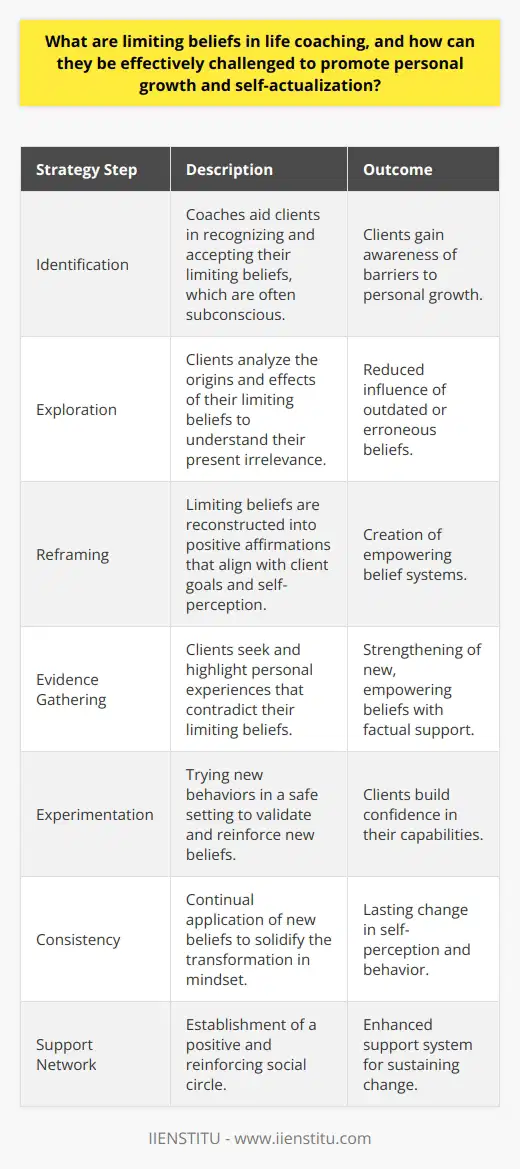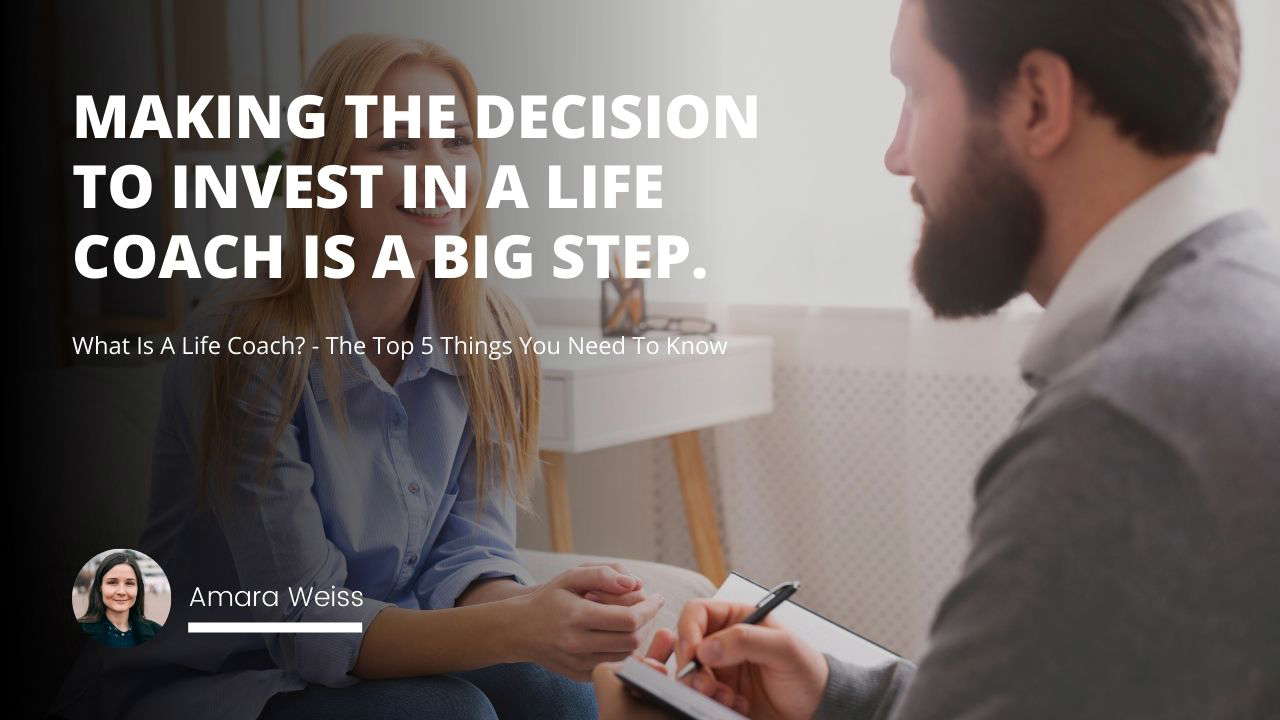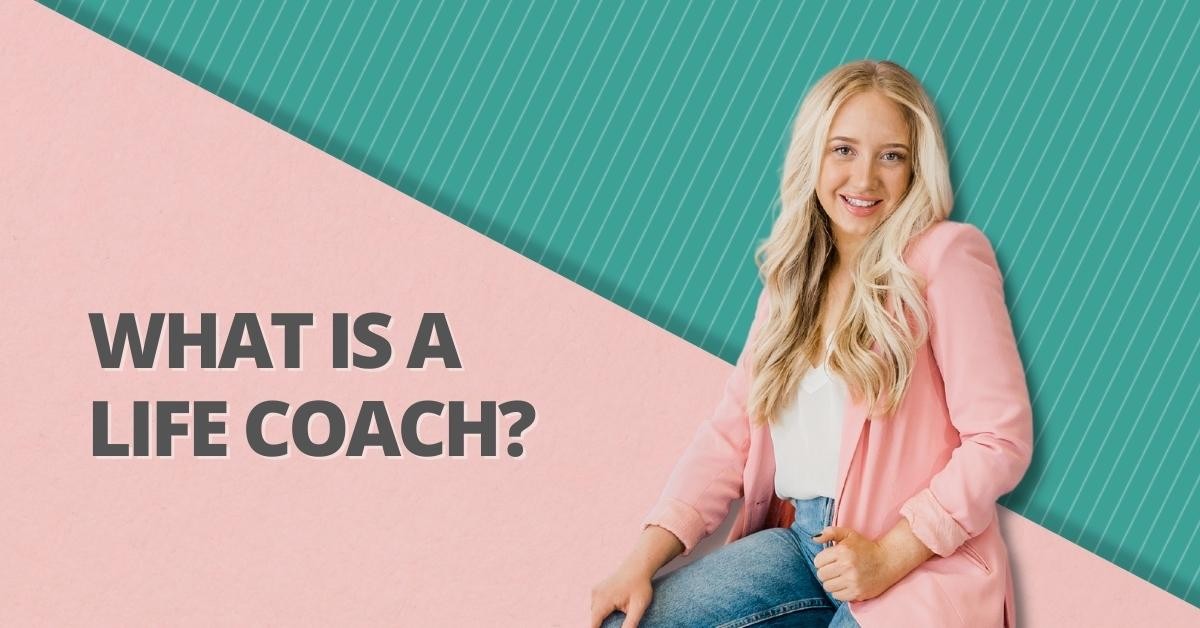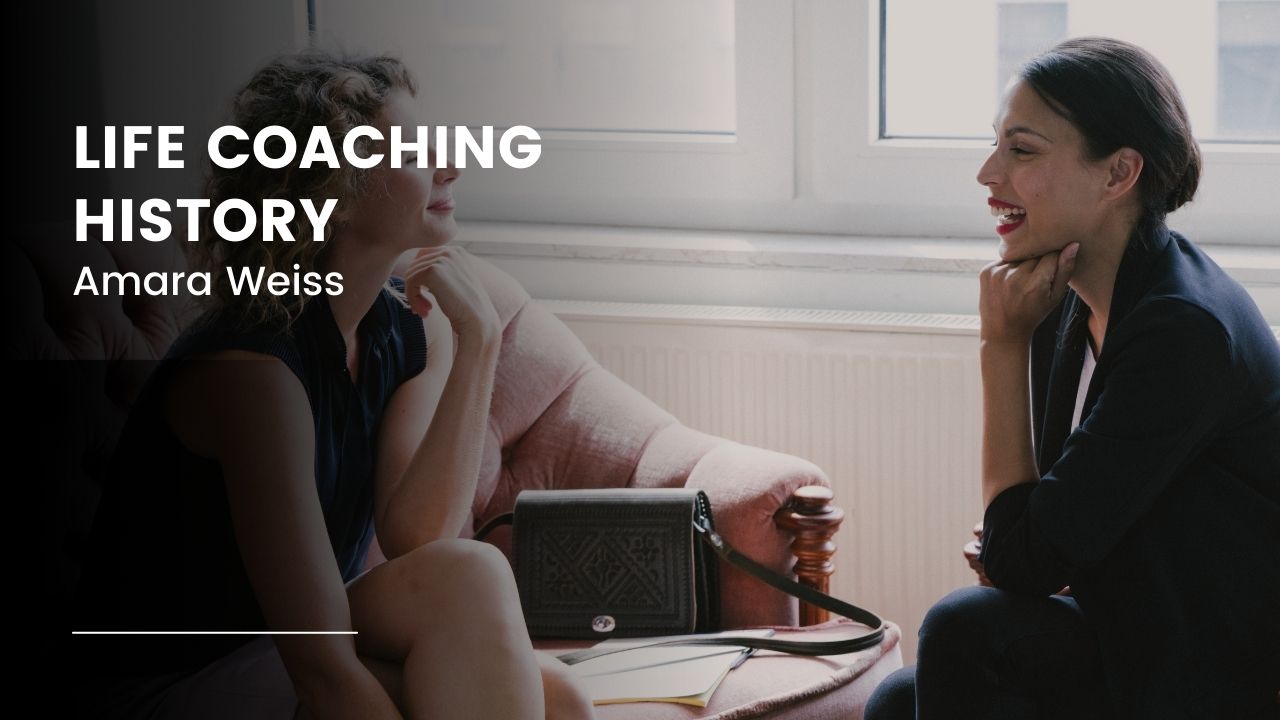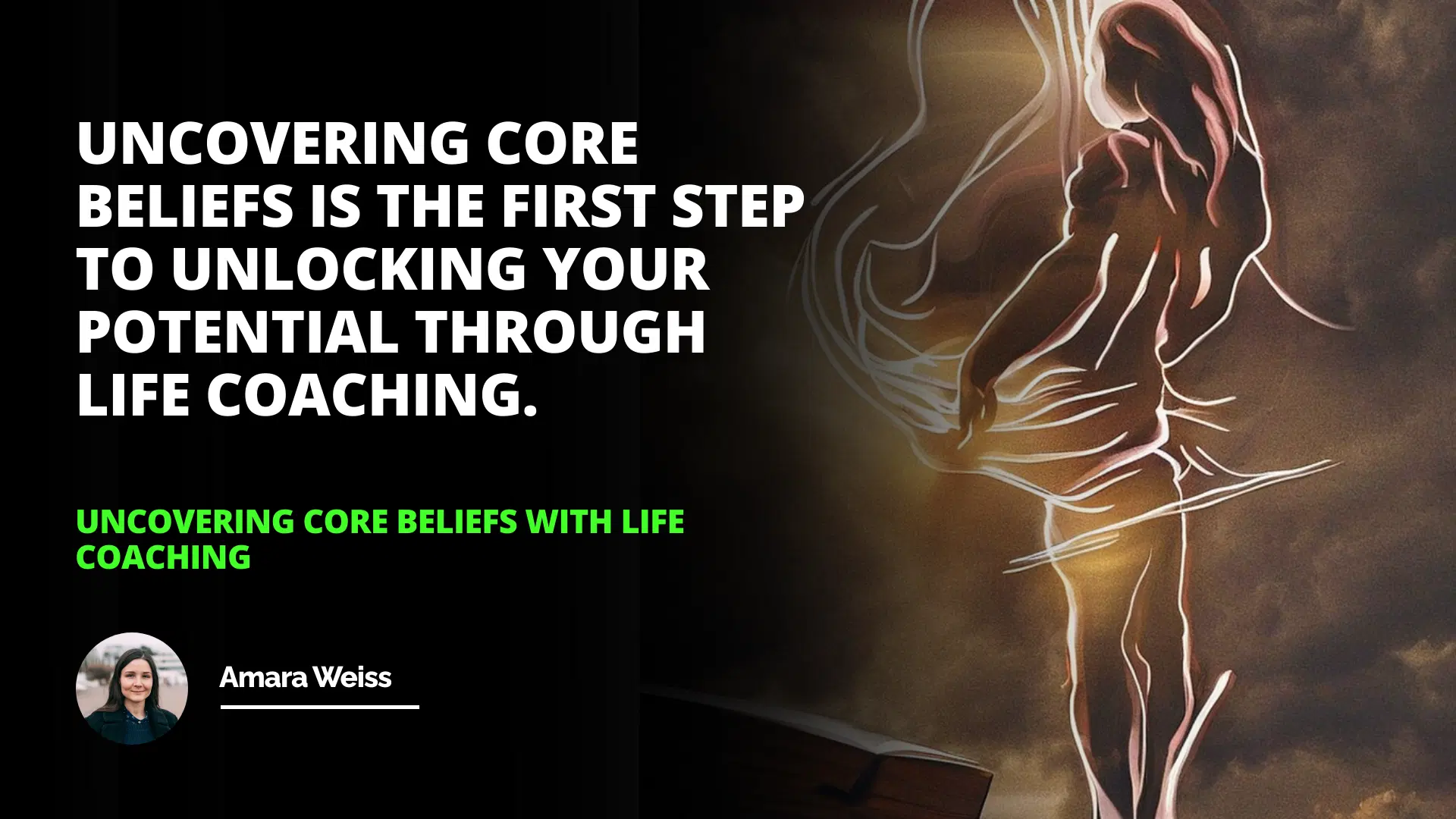
Introduction
I still remember the first time I stumbled upon the concept of life coaching. It was during a casual coffee chat with an old friend who seemed to have transformed his life overnight. He was radiating confidence, enthusiasm, and a zest for life that was both infectious and intriguing. Curious, I asked him about the secret behind his newfound energy. With a warm smile, he introduced me to the world of life coaching.
Introduction
Overview of Life Coaching
Core Beliefs
Uncovering Core Beliefs with Life Coaching
Downward Arrow Technique
Life coaching isn't just a buzzword or a passing trend; it's a powerful tool that has the potential to unlock our deepest potentials. For many of us, understanding our core beliefs and how they shape our daily experiences can be a game-changer. In this article, we'll delve deep into how life coaching helps in uncovering these core beliefs and provide strategies to strengthen our self-image. Along the way, I'll share some personal insights and practical tips that have made a real difference in my life.
Understanding Life Coaching
At its heart, life coaching is a collaborative process where a coach supports an individual in achieving personal and professional goals. It's based on the principle that every person has the innate ability to improve their life, but sometimes, they need a little guidance to navigate the complexities. Life coaches act as facilitators, helping clients optimize their thought processes, overcome obstacles, and develop actionable strategies for success.
What Are Core Beliefs?
Core beliefs are the fundamental assumptions we hold about ourselves, others, and the world around us. They're like the lens through which we view every experience. These beliefs, often formed during our early years, can be empowering or limiting. For instance, a person who believes "I'm capable of overcoming challenges" will approach obstacles differently than someone who thinks "I'm not good enough."
Uncovering Core Beliefs with Life Coaching
One of the pivotal roles of a life coach is to help clients identify these underlying beliefs. By bringing them to the surface, individuals can assess whether these beliefs serve them or hinder their progress.
The Downward Arrow Technique
A popular method used in life coaching to uncover core beliefs is the downward arrow technique. This involves exploring a thought or feeling by continuously asking probing questions until the root belief is uncovered.
How Does It Work?
Imagine feeling anxious about a job interview. Your immediate thought might be, "I'm going to mess this up." Using the downward arrow technique, you'd ask yourself:
1- "What does messing up the interview mean to me?"
2- "It means I won't get the job."
3- "And what does not getting the job mean?"
4- "It means I'm not competent."
5- "What does believing I'm not competent mean?"
By persistently questioning, you might arrive at a core belief like "I'm not worthy of success." Recognizing this allows you to address and challenge it directly.
A Personal Experience with Core Beliefs
Let me share a story from my own journey. There was a time when I avoided social gatherings, convinced that I didn't belong. Every time I received an invitation, I'd feel a knot in my stomach. One day, a life coach helped me use the downward arrow technique:
Me: "I don't want to go to the party."
Coach: "What does going to the party mean to you?"
Me: "I'll feel out of place."
Coach: "And what does feeling out of place mean?"
Me: "That I don't fit in."
Coach: "What does not fitting in say about you?"
Me: "Maybe that I'm unlikable."
Realizing that I held the core belief of being unlikable was a revelation. It wasn't about the parties; it was about how I viewed myself.
Challenging and Changing Core Beliefs
Once a core belief is identified, the next step is to challenge its validity. This involves:
Questioning the Evidence: Is there concrete proof supporting this belief?
Exploring Alternative Perspectives: Could there be another way to view the situation?
Cognitive Restructuring: Replacing negative beliefs with positive, realistic ones.
Strategies for Strengthening Self-Image
Enhancing self-image isn't an overnight process, but with consistent effort, it's achievable. Here are some strategies that have been effective:
1- Affirmations: Regularly repeating positive statements about oneself can gradually shift beliefs. For example, "I am competent and deserving of success."
2- Journaling: Writing down thoughts and feelings can help identify patterns and track progress.
3- Surrounding Yourself with Positivity: Engage with people who uplift and support you.
4- Setting Achievable Goals: Small successes build confidence over time.
5- Mindfulness and Meditation: These practices foster self-awareness and reduce negative self-talk.
Applying These Strategies: A Real-Life Example
Returning to my earlier story, after identifying my core belief of feeling unlikable, I began to challenge it:
Uncovering core beliefs is the first step to unlocking your potential through life coaching.
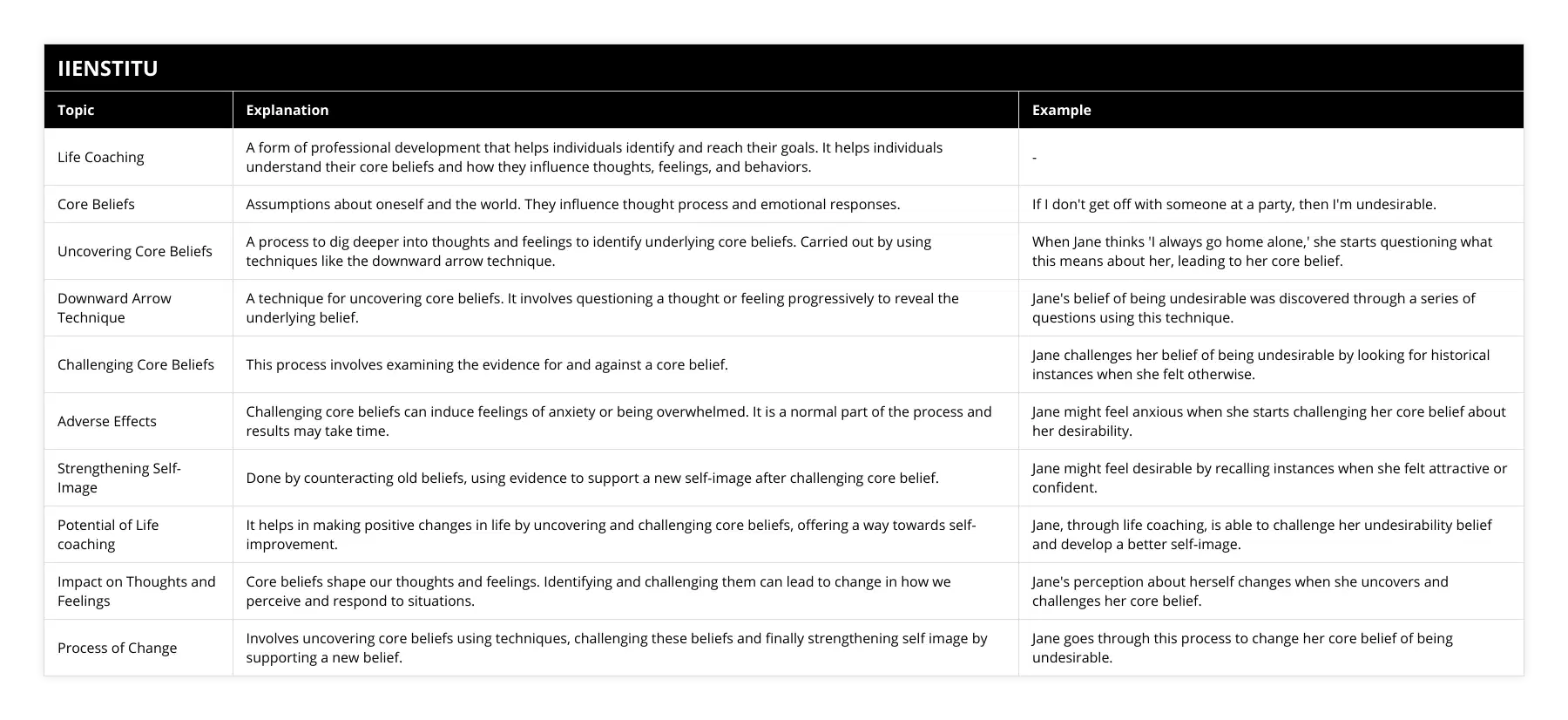
Evidence Against: I had close friends and family who enjoyed my company.
Alternative Perspective: Maybe my anxiety made me perceive situations inaccurately.
Action Plan: I started accepting invitations, even when it felt uncomfortable, and practiced positive affirmations daily.
Over time, not only did my social anxiety diminish, but I also formed new, meaningful relationships.
The Adverse Effects and Navigating Them
It's important to acknowledge that confronting deep-seated beliefs can be unsettling. Feelings of anxiety, discomfort, or even sadness might surface. Here's how to navigate these emotions:
Seek Support: Talk to trusted friends, family, or professionals.
Practice Self-Compassion: Remind yourself that it's okay to feel this way; change takes time.
Stay Committed: Remember your reasons for embarking on this journey.
Integrating Life Coaching Principles into Everyday Life
Life coaching isn't limited to sessions with a coach. You can incorporate its principles into daily routines:
Daily Reflection: Spend a few minutes each day reflecting on your thoughts and feelings.
Set Intentions: Begin each day by setting a positive intention or goal.
Celebrate Wins: No matter how small, acknowledge your achievements.
Optimizing Your Personal Growth Process Tips
To truly embrace change and optimize your personal growth process, consider the following tips:
Stay Curious: Always be open to learning more about yourself.
Be Patient: Transformation doesn't happen overnight.
Embrace Failures: See them as learning opportunities, not setbacks.
Seek Resources: Books, workshops, and seminars can provide additional insights.
Connecting Back to Supply Chain Management
You might be wondering how all this ties into other areas of life, such as business or even supply chain management. Interestingly, the principles of uncovering core beliefs and optimizing processes are universal. Just as individuals can optimize their thought processes for better outcomes, businesses can optimize supply chain management process tips to enhance efficiency and productivity. Both require introspection, challenging existing beliefs or practices, and implementing strategies for improvement.
Conclusion
Uncovering and challenging core beliefs through life coaching is a transformative journey. It's about peeling back the layers to understand what truly drives us, then making conscious choices to foster a more positive self-image. Whether it's improving personal relationships, advancing in a career, or simply finding joy in everyday moments, recognizing and reshaping our core beliefs can lead to profound changes.
As I reflect on my own experiences, I'm reminded of a quote from "The Road Less Traveled" by M. Scott Peck (1978): "The journey of self-discovery is the most rewarding journey of all." Embracing life coaching principles has not only helped me uncover limiting beliefs but also empowered me to step into a more authentic and fulfilling life.
References
Beck, A.T. (2011). Cognitive Therapy of Depression. New York: Guilford Press.
Peck, M. S. (1978). The Road Less Traveled. New York: Simon & Schuster.
Whitmore, J. (2009). Coaching for Performance. Boston: Nicholas Brealey Publishing.
Dweck, C.S. (2006). Mindset: The New Psychology of Success. New York: Random House.
Italicized, bolded, and underlined for emphasis throughout the text.
Frequently Asked Questions
What techniques are used to uncover core beliefs with life coaching?
Life coaching is a powerful tool to help people identify and work through their core beliefs. Core beliefs, also known as core values, are deeply held convictions that shape our thinking and acting. These beliefs can come from various sources and are often related to our upbringing, society, and culture. Life coaches use multiple techniques to help clients uncover and work through their core beliefs.
One technique used to uncover core beliefs is to ask open-ended questions. These questions can help the coach and client identify conscious and unconscious thoughts. By exploring these beliefs, the client can start recognizing their thinking and behavior patterns.
Another technique used in life coaching is the use of reflective listening. This tool involves the coach actively listening to and repeating the client’s words. This can help the client gain insight into their thoughts and feelings. Additionally, it can help the coach to gain a better understanding of the client’s core beliefs.
A third technique used to uncover core beliefs is visualization and guided imagery. This process involves the coach guiding the client through a series of mental images that can help them to explore their core beliefs. Clients can understand how their core beliefs influence their behavior by visualizing themselves in different situations.
Finally, life coaches can use psychodynamic techniques to uncover core beliefs. This process involves exploring the client’s past experiences and how they may affect their current life. By exploring these experiences, the client can gain insight into their core beliefs and how they impact their lives.
Life coaching can be a powerful tool for uncovering core beliefs. By using open-ended questions, reflective listening, visualization and guided imagery, and psychodynamic techniques, a life coach can help their clients gain insight into their thoughts and feelings. These techniques can help clients identify and work through their core beliefs, leading to greater self-awareness and growth.

How can life coaching help to strengthen a person's self-image?
Self-image is integral to a person’s identity and overall psychological well-being. It is essential to ensure that a person’s self-image is positive and healthy, as this can significantly impact a person’s life. Life coaching can be an effective tool to help strengthen a person’s self-image.
Life coaching is a form of counseling and mentorship that focuses on helping individuals reach their goals and achieve their desired outcomes. Through life coaching, individuals can gain insight into their current situation, identify and challenge their limiting beliefs, and develop a plan of action to move forward.
Life coaching can help to strengthen a person’s self-image in several ways. First, life coaching can help people gain insight into their behavior and actions. This can help a person identify and challenge negative and self-defeating patterns of thinking and behavior. Through this insight, a person can see themselves in a more positive light and develop a more positive self-image.
Second, life coaching can help individuals to set realistic goals and develop strategies for achieving them. When a person can achieve their goals, it can give them a sense of accomplishment and boost their self-confidence. This can help to build a person’s self-image and give them a more positive outlook on their capabilities.
Finally, life coaching can help a person to develop practical communication skills. Effective communication skills are essential for a person’s relationships, both personal and professional, and can help to foster a more positive self-image. Through life coaching, individuals can learn how to effectively communicate their needs, thoughts, and feelings respectfully and constructively.
In conclusion, life coaching can be a powerful tool to help individuals strengthen their self-image. Through life coaching, individuals can gain insight into their behavior, set realistic goals, and develop practical communication skills. All these factors can help build a person’s self-image and give them a more positive outlook on their capabilities.
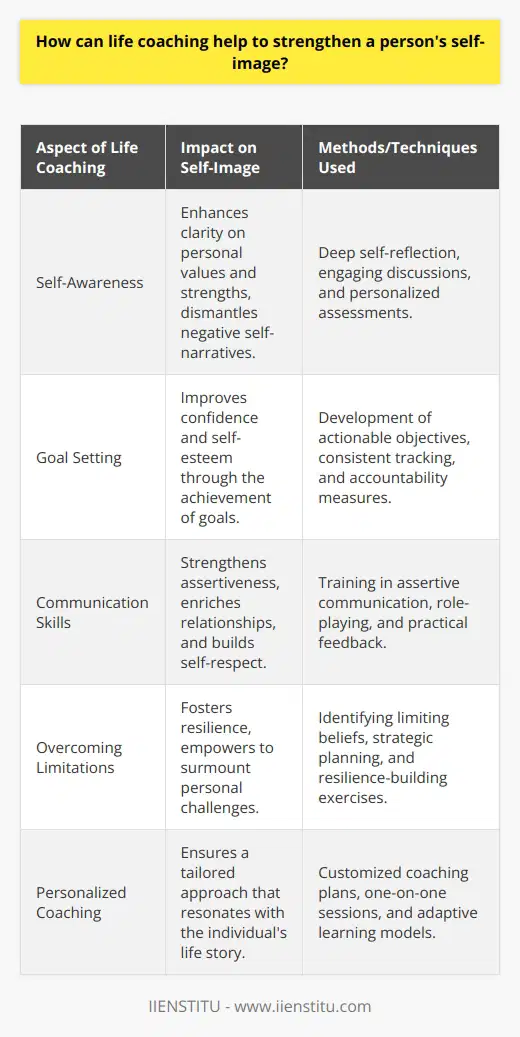
What is the Downward Arrow Technique and how is it used in life coaching?
The Downward Arrow Technique is an effective method used in life coaching to help clients gain clarity and insight into their issues. This technique allows clients to explore their thoughts and feelings in a safe and non-judgmental environment. The method can help clients gain insight into their current situation and identify potential solutions to their problems.
The Downward Arrow Technique is based on the concept that all problems have an underlying cause. Using this technique, the life coach helps the client identify the underlying cause of their pain. This is done by asking the client to start at the surface of the problem and work their way down to the root of it. The coach helps the client to identify and explore their feelings, beliefs, and thoughts associated with their problem. The coach also helps the client identify any unmet needs or fears contributing to the problem.
Once the client has identified their problem's underlying cause, they can start working on finding solutions. The coach helps the client to brainstorm potential solutions and encourages them to take action. By taking action, the client can build confidence in their ability to find answers.
The Downward Arrow Technique is an effective method for helping clients gain insight into their problems and identify potential solutions. This technique helps clients explore their thoughts and feelings in a safe and non-judgmental environment. It can also help the client build their confidence and take action. The method can be used in individual or group life coaching sessions and online coaching sessions.
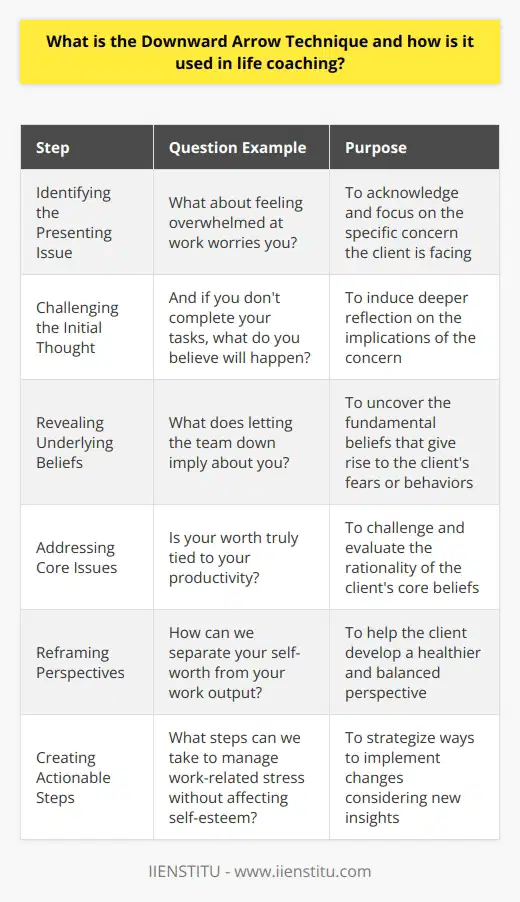
How do coaches approach managing limiting beliefs in the context of life coaching?
Identifying Limiting Beliefs
Life coaches are trained professionals who work with individuals to help them identify and overcome barriers in their personal and professional lives. One common barrier to achieving success and personal growth is the presence of limiting beliefs, which can hinder a person's ability to set goals and achieve desired outcomes. Coaches approach managing limiting beliefs by employing a variety of strategies, which can include awareness, reframing, and cultivating self-compassion.
Creating Awareness
The initial step coaches take toward managing limiting beliefs is increasing a client's awareness of their existence. Clients may be unaware of how their thoughts and beliefs may be holding them back, therefore, coaches often use targeted questions and introspective exercises to help clients become mindful of their limiting beliefs. Increased awareness allows clients to acknowledge and address these beliefs, enabling personal growth and change.
Reframing Beliefs
Reframing techniques take clients through a process of questioning and evaluating their limiting beliefs, allowing them to explore alternative perspectives and create new, empowering beliefs. Coaches facilitate this shift by helping clients identify negative thought patterns and guiding them to replace those with positive and constructive beliefs. Reframing can involve challenging clients to consider different outcomes, adopting new perspectives, or viewing circumstances in a more productive light.
Fostering Self-Compassion
Self-compassion, or offering kindness and understanding toward oneself as one would to a friend or loved one, plays a crucial role in managing limiting beliefs. Coaches teach clients ways to practice self-compassion and create a nurturing inner dialogue, which can help break the cycle of self-defeating beliefs. Encouraging clients to accept themselves and their emotions without judgment provides a supportive foundation for challenging and overcoming limiting beliefs.
Conclusion
In the context of life coaching, managing limiting beliefs entails identifying, reframing, and fostering self-compassion. By enhancing self-awareness and enabling clients to adopt new, more empowering beliefs, life coaches facilitate personal growth and help individuals overcome barriers to success. This approach to managing limiting beliefs not only leads to increased motivation and self-efficacy but ultimately supports clients in setting and achieving their goals.
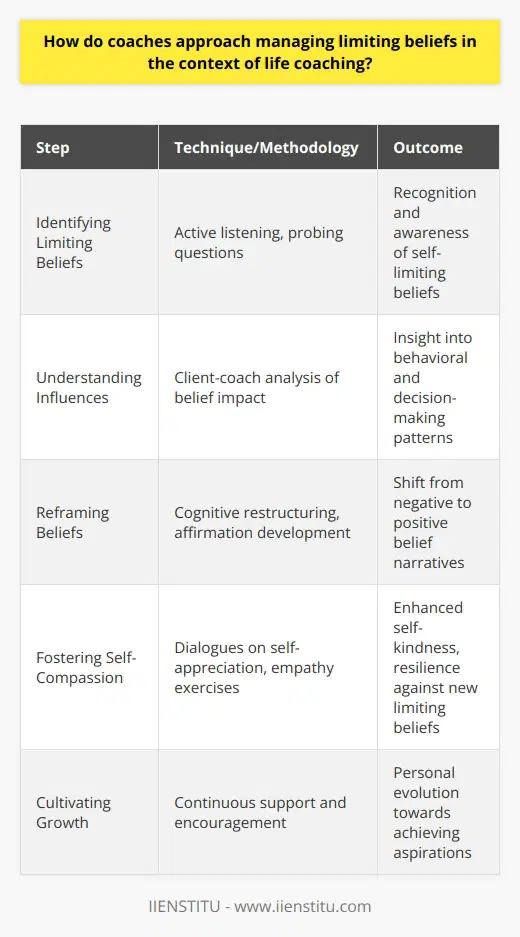
Why is it essential for coaches to establish and understand their own core values in their practice?
Core Value Identification
Establishing and understanding one's own core values is essential for coaches, as these values act as guiding principles for their coaching practice. Core values provide a foundation for professional behavior and ethical decision-making, ensuring that coaches prioritize the well-being and development of their athletes. They can also influence the goals and objectives of a coaching program, shaping its overall direction and purpose.
Aligning Practice with Values
By identifying their core values, coaches can ensure that they maintain a consistent approach to their work. This can, in turn, increase the effectiveness of their coaching interventions as it enables them to develop and sustain a clear coaching philosophy. A coherent coaching philosophy can help foster trust and respect among athletes, inspiring them to believe in and commit to the growth process.
Increasing Self-Awareness
Developing an understanding of one's own core values is also crucial for self-awareness and personal growth. As coaches explore and refine their core values, they become more in tune with their own beliefs, motivations, and behaviors. This increased self-awareness can enhance coaching quality, as it allows for more open and authentic communication between the coach and the athletes. This type of communication is vital for creating a strong athlete-coach relationship based on mutual understanding and respect.
Promoting Ethical Decision-Making
In coaching, ethical dilemmas frequently arise, and understanding their own core values can help coaches navigate these situations effectively. By grounding their decision-making in their core values, coaches can operate from a place of integrity and ensure that their choices prioritize the long-term welfare of their athletes. This alignment between values and actions fosters an environment in which athletes feel secure and supported, ultimately promoting their personal and athletic development.
Conclusion
In conclusion, it is vital for coaches to establish and understand their own core values, as they serve as the foundation for their professional practice. By identifying and adhering to their core values, coaches can enhance their self-awareness, promote ethical decision-making, and create a supportive environment for their athletes. Furthermore, a clear understanding and embodiment of their own core values ensure that coaches can inspire their athletes to adopt these principles, fostering a community of shared values and mutual respect.
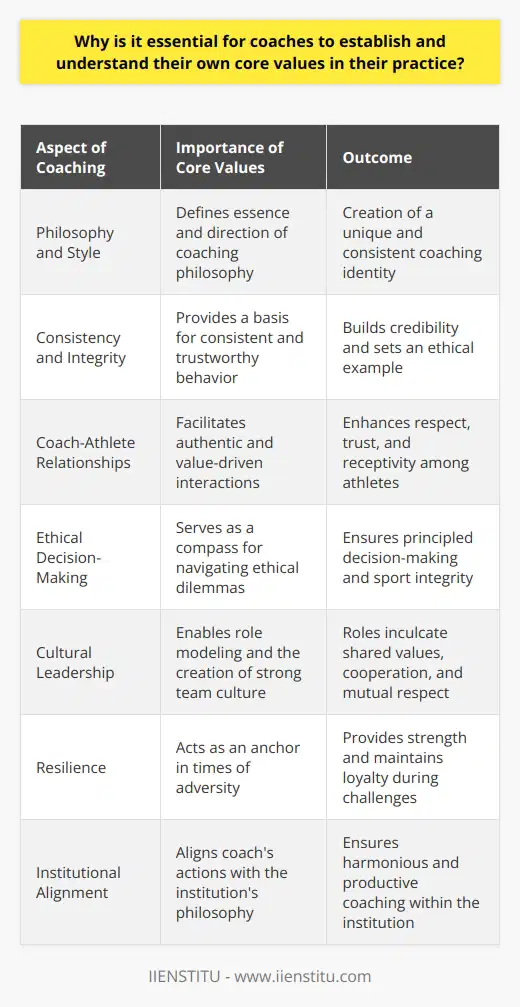
What methods can be employed to assess and challenge one's own values and beliefs within the coaching relationship?
Methods of Self-Assessment
A crucial aspect of a coaching relationship is the ability of both parties to assess and challenge their own values and beliefs. Several methods can be employed for this purpose, promoting self-awareness and growth within the coaching relationship.
Reflective Practice
Engaging in reflective practice involves examining one's own actions, reactions, and motivations within the coaching relationship. By consistently reflecting on these aspects, coaches and clients can enhance their self-awareness and identify areas where their values and beliefs may influence the coaching process.
360-Degree Feedback
Soliciting 360-degree feedback can be a valuable way to obtain a comprehensive assessment of one's values and beliefs from multiple perspectives. This approach typically involves gathering feedback from various sources, such as peers, supervisors, and subordinates, which allows for a well-rounded understanding of one's own attitudes and behavior within the coaching relationship.
Critical Thinking Exercises
Critical thinking exercises can facilitate the identification of biases, assumptions, and limiting beliefs by prompting coaches and clients to question their own thought processes. This method encourages individuals to critically evaluate their values and beliefs, ensuring that they are appropriate and useful within the coaching relationship.
Journaling
Maintaining a journal can aid in the exploration of one's values and beliefs by providing a safe space for reflection and processing of thoughts and feelings. Regular journal entries can help reveal patterns and recurring themes, enabling individuals to identify areas where growth and development may be necessary.
Seeking Supervision or Mentorship
Engaging in supervision or mentorship within the coaching field provides an opportunity to receive guidance and feedback from experienced professionals. This can be instrumental in challenging one's own values and beliefs, as it promotes a deeper understanding of the coaching process and encourages the development of best practices.
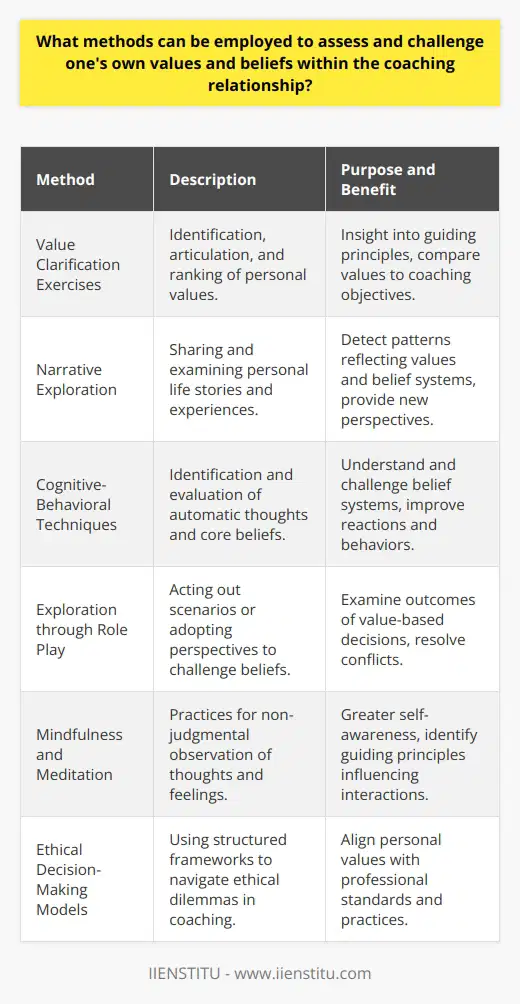
How do you uncover core beliefs through cognitive behavioral therapy (CBT)?
Uncovering Core Beliefs in CBT
Cognitive behavioral therapy (CBT) is a popular and effective modality for identifying and challenging deep-seated core beliefs. Identifying core beliefs involves a combination of self-reflection, therapeutic questioning, and behavioral experiments, leading to enhanced self-awareness, improved mental health, and better interpersonal relationships.
Self-Reflection Techniques
Self-reflection is a critical component of CBT, allowing individuals to examine their thought patterns and emotional reactions in various situations. This introspective process enables them to recognize inconsistent thinking, negative self-talk, and automatic thoughts that are often influenced by underlying core beliefs.
Therapeutic Questioning
During CBT sessions, therapists employ a range of targeted questions to help clients identify and explore their core beliefs. These questions may address past experiences, emotional triggers, and common themes in clients' thoughts and behaviors. By encouraging clients to examine their thought patterns and reactions, therapists facilitate the discovery of the underlying beliefs that shape their perceptions and actions.
Behavioral Experiments
To test the validity and functionality of core beliefs, CBT therapists often use behavioral experiments. Clients are guided in designing and executing practical exercises to challenge their assumptions, allowing them to gather evidence that supports or contradicts their beliefs. These experiments provide clients with objective data to assess the accuracy and utility of their beliefs, further enabling them to identify and modify maladaptive thoughts and behaviors.
Role of Values and Desires
Core beliefs are closely connected to an individual's values and desires. In CBT, therapists help clients evaluate whether their beliefs align with their inherent values and assist them in determining whether their desires are being met. This comparison serves dual purposes, enabling clients to identify any misaligned principles and motivating the subsequent modification of core beliefs that hinder the pursuit of fulfilling goals.
Therapeutic Relationship and Trust
The therapeutic relationship is crucial for the successful uncovering of core beliefs. Trust between the client and therapist establishes a safe environment where clients feel comfortable disclosing personal thoughts and emotions. This secure space fosters an open exchange of ideas, promoting self-discovery, and the challenging of long-held beliefs. As a result, clients are more open to scrutinizing and modifying their core beliefs to achieve a healthier mentality.
In conclusion, cognitive behavioral therapy provides valuable tools and techniques, such as self-reflection, therapeutic questioning, behavioral experiments, and the exploration of values to effectively identify and examine core beliefs. Through the establishment of trust and open communication within the therapeutic relationship, individuals can embark on a transformative journey of self-discovery and mental health improvement.
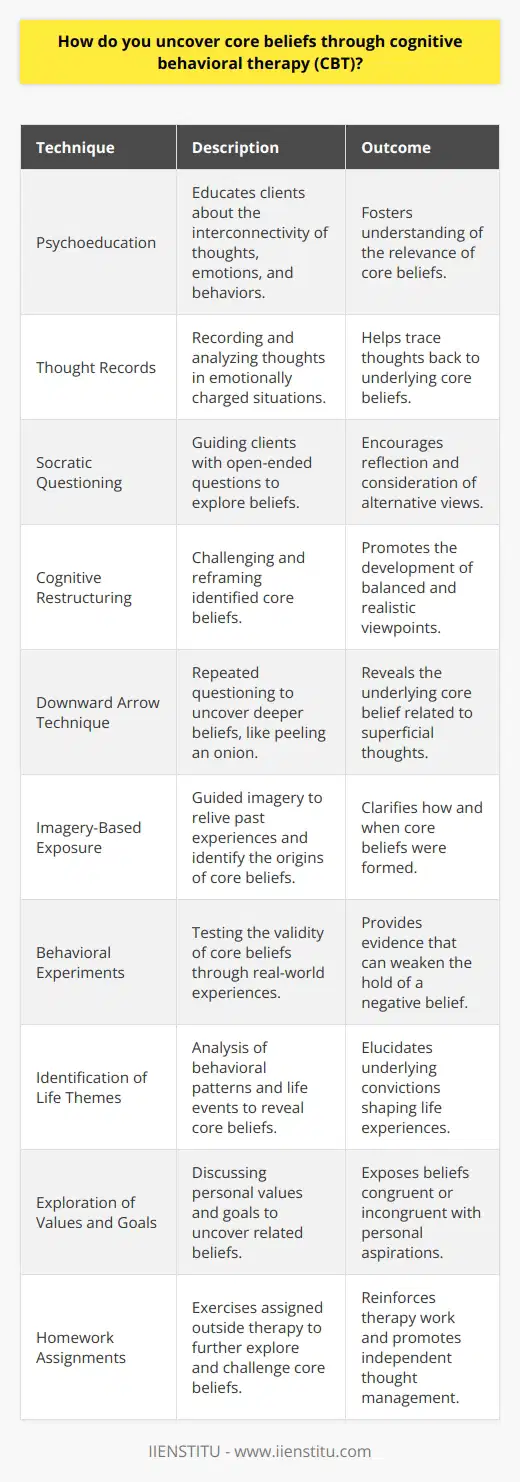
What are the potential consequences of unexamined limiting beliefs in a life coaching context?
Consequences of Unexamined Limiting Beliefs
Effects on Client's Growth
Unexamined limiting beliefs in a life coaching context can have severe consequences on a client's personal growth and development. These unchallenged assumptions can create a false reality, negatively affecting decision-making and goal-setting.
Hindered Coaching Effectiveness
The coach's effectiveness is undermined when they fail to address a client's limiting beliefs. This can lead to misaligned goals, superficial progress, and a lack of lasting transformation.
Reduced Sense of Self-Worth
Unchecked limiting beliefs can leave a client feeling inadequate or unworthy. These negative feelings can result in reduced self-confidence, dampening the client's motivation and overall success in achieving their goals.
Increased Anxiety and Fear
Limiting beliefs often breed anxiety and fear, as they impose boundaries on the client's perceived abilities. Being unaware of these constraints, the client may become anxious or fearful and show resistance to change.
Reinforcing Unhealthy Behavior Patterns
Failing to challenge a client's limiting beliefs can inadvertently reinforce unhealthy behavior patterns. The coach may unintentionally support these patterns, preventing the client from realizing their full potential.
Stunted Goal Achievement
When limiting beliefs remain unchallenged, the client's goals may be narrowed or confined within these perceived boundaries. This can hinder the client from setting ambitious and fulfilling goals, ultimately reducing overall satisfaction in their achievements.
Decreased Relationship Trust
Ineffective coaching resulting from unexamined limiting beliefs can weaken the trust between the coach and client. As the client fails to experience significant progress, they may question the value of the coaching relationship.
In conclusion, unexamined limiting beliefs can severely impede a client's growth and development within a life coaching context. To create a positive coaching experience that fosters transformation, coaches must identify and challenge these beliefs to enable clients to overcome self-imposed barriers and achieve lasting change.
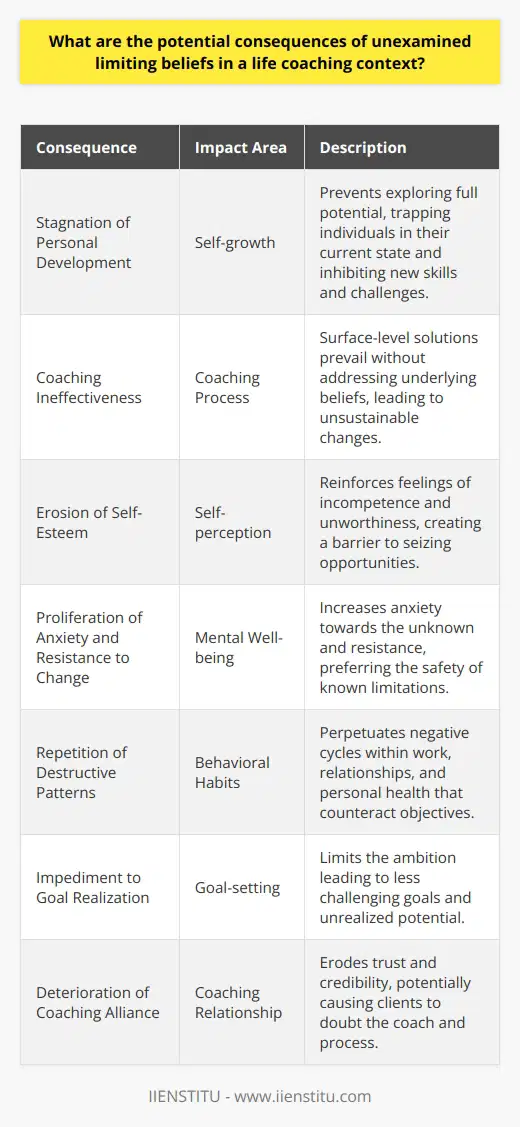
Why is it important for coaches to be aware of the role their own values and beliefs may play in shaping their coaching approach and potential biases?
Role of Values and Beliefs in Coaching Approach
It is crucial for coaches to recognize the impact their personal values and beliefs may have on their coaching approach. This is due to the potential influence these factors can exert on a coach's perspective, decision-making, and overall effectiveness. By understanding and acknowledging one's own biases, a coach can better adapt their approach to best suit the needs of their athletes and ultimately promote a more inclusive and successful environment.
Influence on Perspective and Decision-Making
A coach's values and beliefs shape their perspective, which in turn influences the way they perceive and respond to various situations. For instance, a coach's attitudes towards discipline, work ethic, or fair play can directly impact the training sessions they design and their decision-making process during competitions. Furthermore, these influences can manifest as subtle biases in areas such as playing time allocation, athlete selection, or goal setting. Therefore, self-awareness of these biases ensures that coaches make more objective decisions, contributing to a fair and balanced coaching approach.
Promoting Inclusivity and Success
An awareness of personal values and beliefs can also contribute to an inclusive coaching environment. When coaches are cognizant of how their own biases may impact athletes, they are more likely to create a climate that embraces diversity and fosters athlete engagement. This inclusive environment can help athletes feel valued and understood, which can positively impact their motivation, commitment, and overall well-being. Consequently, this can lead to improved performance and team success.
Adapting Coaching Strategies
Lastly, recognizing the impact of their own values and beliefs allows coaches to adapt their coaching strategies to best fit the needs of their athletes. For example, if a coach becomes aware of a tendency to favor a certain style of play, they can then intentionally incorporate alternative strategies or ideas to diversify their coaching repertoire. In doing so, coaches can accommodate various learning styles, preferences, and backgrounds, resulting in a more well-rounded and effective coaching approach.
In conclusion, understanding the role of personal values and beliefs in one's coaching approach can significantly enhance a coach's effectiveness. By acknowledging and addressing potential biases, coaches can foster a more objective and inclusive environment, ultimately benefiting both the athletes and the overall success of the team.
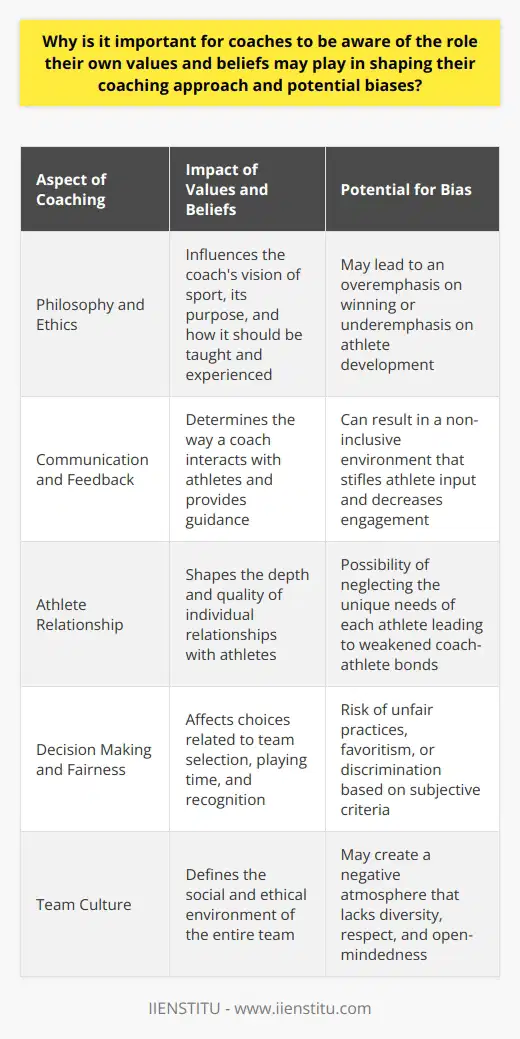
How do you uncover a core belief through the use of various therapeutic techniques?
Uncovering Core Beliefs through Therapeutic Techniques
Core beliefs are the fundamental convictions that individuals hold about themselves, others, and the world. These beliefs are often deeply ingrained and can influence one's emotions, thoughts, and behaviors. Uncovering core beliefs can be possible through various therapeutic techniques, allowing room for personal growth and healing.
Cognitive Behavioral Therapy (CBT)
CBT is a widely-recognized therapeutic approach utilized to identify and change maladaptive thoughts and behaviors. By examining the interconnection of thoughts, emotions, and actions, therapists can help clients uncover their core beliefs and challenge them to adopt healthier perspectives.
Schema Therapy
Similar to CBT, Schema Therapy is another psychotherapeutic approach that addresses core beliefs, known as 'schemas.” Through the use of experiential techniques and emotion-focused interventions, Schema Therapy helps clients gain insight and awareness of their underlying beliefs, enabling them to modify or replace these deeply-rooted cognitive patterns.
Narrative Therapy
By encouraging clients to explore their personal stories and lived experiences, Narrative Therapy allows for the deconstruction of core beliefs that may be limiting their potential. This therapeutic approach relies on storytelling, conversation, and reflection to identify and reshape influencing beliefs.
Acceptance and Commitment Therapy (ACT)
ACT, a form of mindfulness-based therapy, focuses on accepting unhelpful thoughts and emotions while committing to actions that align with one's values. Through techniques such as cognitive defusion and mindful acceptance, clients can unveil core beliefs and challenge their rigid thought processes.
Internal Family Systems (IFS) Therapy
IFS is an integrative model of psychotherapy that views individuals as possessing various subpersonalities or 'parts.” By investigating each part's role, clients can trace back to their origin and uncover the core beliefs that may be influencing thoughts, emotions, and behaviors negatively.
In conclusion, therapeutic techniques such as CBT, Schema Therapy, Narrative Therapy, ACT, and IFS provide effective ways to uncover core beliefs. By working closely with a mental health professional specializing in these approaches, individuals can gain increased self-awareness, foster personal growth, and establish healthier patterns in their lives.
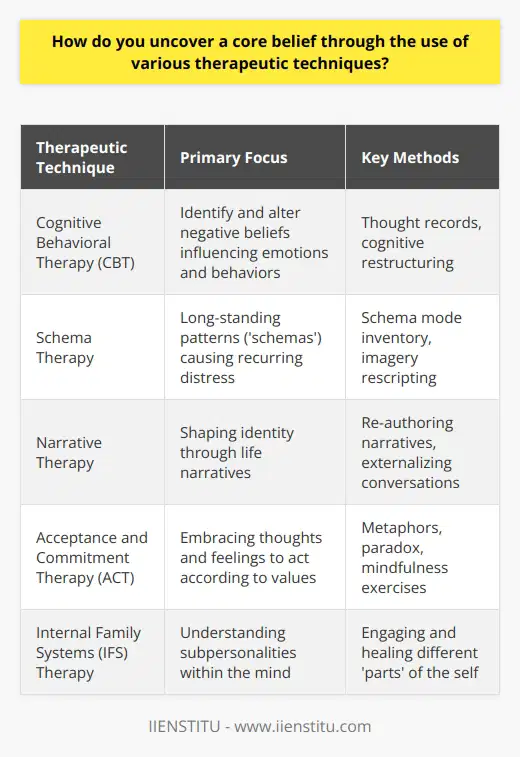
Why is it important for coaches to be aware of their own values and beliefs when working with clients to avoid potential biases and maintain objectivity?
Understanding Personal Values and Beliefs
Coaches must be aware of their own values and beliefs while working with clients to maintain a professional relationship and uphold ethical standards. The awareness of personal biases allows coaches to mitigate potential negative impacts on the coaching process and client outcomes.
Self-Awareness and Objectivity
Self-awareness is vital in avoiding potential biases that may hinder the coaching relationship. A coach's values and beliefs influence their perceptions, decision-making, and communication style. By understanding personal biases, coaches can strive for objectivity during client interactions.
Maintaining Professional Boundaries
Professional boundaries are essential to establish and maintain an effective coaching relationship. Coaches who acknowledge their values and beliefs can set appropriate boundaries, ensuring they do not impose personal views on clients. This upholds the autonomy of clients, empowering them to make their own decisions.
Enhancing Cultural Competence
In today's diverse society, cultural competence is a necessary skill for coaches. An awareness of personal values and beliefs facilitates deeper understanding and respect for clients' cultural backgrounds, leading to more effective coaching strategies. This attentiveness to diversity is vital to avoid unintentional discrimination or offense.
Promoting Ethical Practice
Adhering to ethical guidelines is crucial in the coaching profession. When coaches recognize their values and beliefs, potential conflicts of interest, and ethical dilemmas become more transparent. Addressing these concerns proactively ensures that the coaching relationship remains professional, impartial, and focused on the client's needs and goals.
Navigating Challenging Situations
Conversations about sensitive topics are not uncommon during coaching sessions. By being aware of personal values and beliefs, coaches can navigate these challenging situations without judgment or prejudice. A neutral stance encourages open communication and helps clients feel safe to express themselves freely.
Improving Trust and Rapport
Trust and rapport are the foundations of an effective coaching relationship. By demonstrating awareness and management of personal biases, coaches signal integrity and sincerity to clients. This strengthened connection facilitates deeper exploration and understanding of the client's experiences, feelings, and goals.
In conclusion, having an awareness of personal values and beliefs is essential for coaches to ensure objectivity, maintain professional boundaries, enhance cultural competence, promote ethical practice, navigate challenging situations, and foster trust and rapport with clients. By committing to self-awareness and continued personal growth, coaches can provide an empowering and supportive environment for their clients to achieve their desired outcomes.
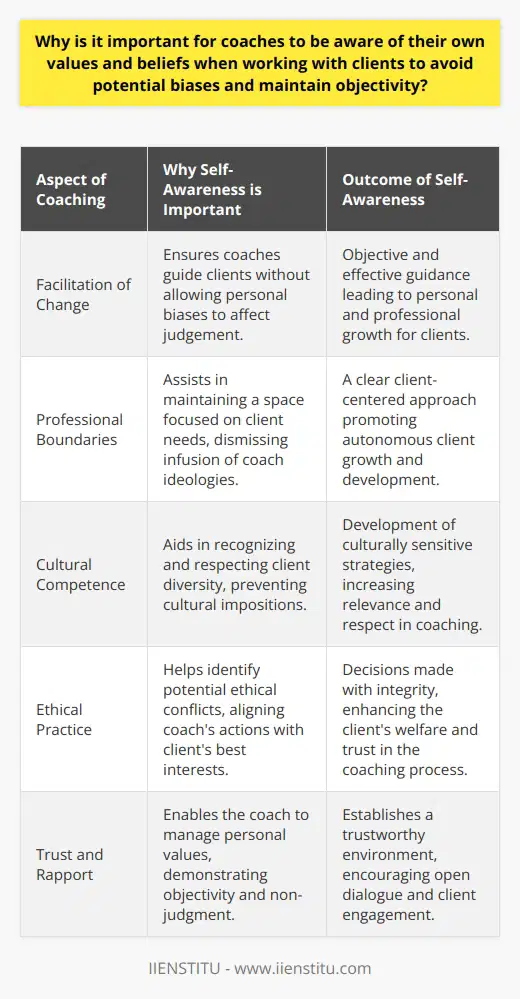
How do you target core beliefs in the coaching process to facilitate client growth and personal development?
Identifying Core Beliefs
Targeting core beliefs in the coaching process is crucial for fostering client growth and personal development. Core beliefs refer to deeply held convictions that guide our thoughts, feelings, and behaviors. To effectively tackle these beliefs, coaches should utilize a structured approach involving exploration, reflection, and strategic intervention.
Exploration and Reflection
The first step in targeting core beliefs within the coaching process is exploration. Coaches should create a safe space for open dialogue, allowing clients to discuss their core beliefs and examine internal narratives. Through reflective questioning, coaches help clients recognize the origin and impact of their beliefs on their daily lives.
Strategic Intervention
Once core beliefs are identified, strategic intervention is necessary for modifying negative beliefs and fostering positive ones. Coaches need to employ specific coaching techniques, such as cognitive restructuring, to facilitate a shift in perspective. This requires challenging and reframing clients' thoughts, helping them replace limiting beliefs with constructive alternatives.
Tracking Progress
During the coaching journey, it is essential to track clients' progress in addressing core beliefs. Coaches can use various tools, such as SMART (Specific, Measurable, Achievable, Relevant, and Time-bound) goals, to assess progress and ensure clients are making strides towards growth and development. Regular review of progress helps maintain clients' motivation and focus on achieving their objectives.
Emphasizing Self-Compassion
In addition to strategic interventions, emphasizing self-compassion is vital in fostering personal development. Coaches need to encourage clients to treat themselves with kindness, patience, and understanding as they confront and modify their core beliefs. A compassionate approach allows clients to acknowledge and accept their imperfections, developing resilience and promoting lasting change.
Client Empowerment
A crucial aspect of the coaching process is building client confidence in their ability to change their beliefs. By teaching clients skills to self-reflect, challenge, and reframe limiting beliefs independently, coaches empower them to take responsibility for their growth and development. This autonomy fosters sustainable change and leads to a higher chance of long-term success.
In conclusion, targeting core beliefs through exploration, reflection, and strategic interventions is essential for facilitating client growth and personal development in the coaching process. By tracking progress, promoting self-compassion, and empowering clients, coaches can create lasting change and help individuals achieve their full potential.
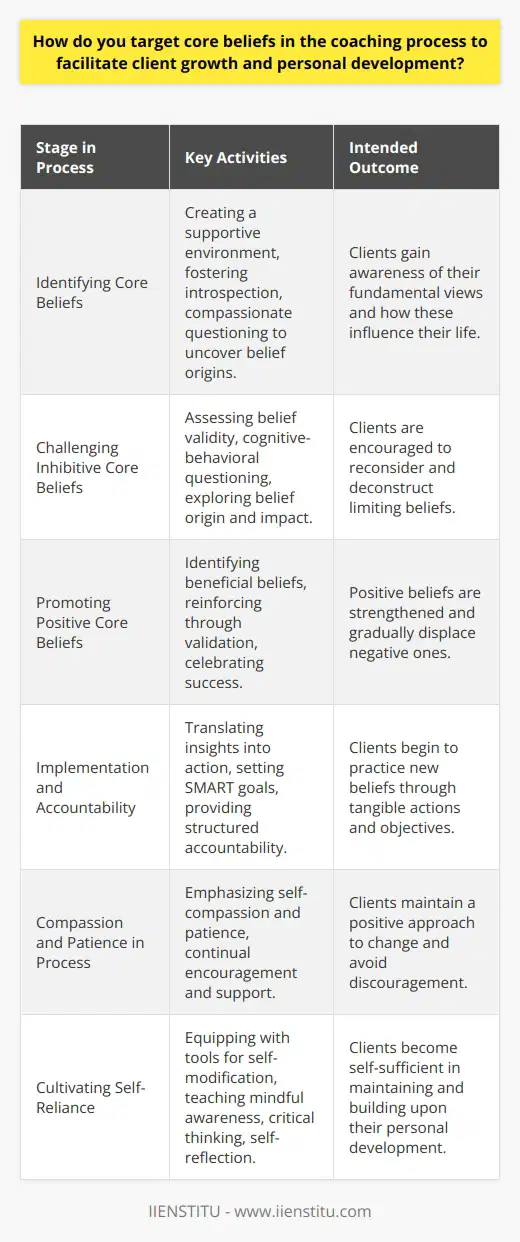
How do you explore core beliefs in therapy to better understand a client's thought patterns and emotional responses?
Identifying Core Beliefs
Uncovering core beliefs forms the backbone of therapy. This process starts with listening carefully to clients, noticing repeated complaints, fears, and descriptions of distressing situations.
Linking Thoughts and Emotions
The therapist should further note a client's thoughts and emotions while discussing these distressing events. This aspect necessitates the application of cognitive-behavioral techniques, allowing the exploration of links between thought patterns and emotional responses.
Using Therapeutic Techniques
Techniques such as thought records or cognitive restructuring can help. The therapist can also utilize Socratic questioning, a dialogue process that promotes active client discussion to surface core beliefs.
Client Self-Reflection
It is crucial to encourage clients to self-reflect between sessions. They can achieve this by maintaining thought diaries, noting their immediate reactions to specific situations. This exercise can help to highlight trends in their thought patterns and emotional responses.
Addressing Implicit Assumptions
The exploration of implicit assumptions is also effective. These are the rules clients hold about how the world should function. By identifying and challenging these assumptions, clients can start to revise unrealistic expectations.
Recognizing Triggers
Identifying triggers fosters self-awareness. These could be certain people, situations or even internal states that activate core beliefs. Understanding these triggers is crucial in shaping more desirable thought patterns and emotional responses.
Uncovering Defensive Mechanisms
Finally, a crucial aspect would be to uncover any defensive mechanisms. These are unconscious strategies clients use to protect themselves, which can often reinforce their core beliefs.
At the heart of each therapeutic relationship, lies a commitment to understanding a client's core beliefs. Though it requires a multifaceted approach, the rewards garnered in terms of transformed thought patterns and emotional responses are undeniably significant.
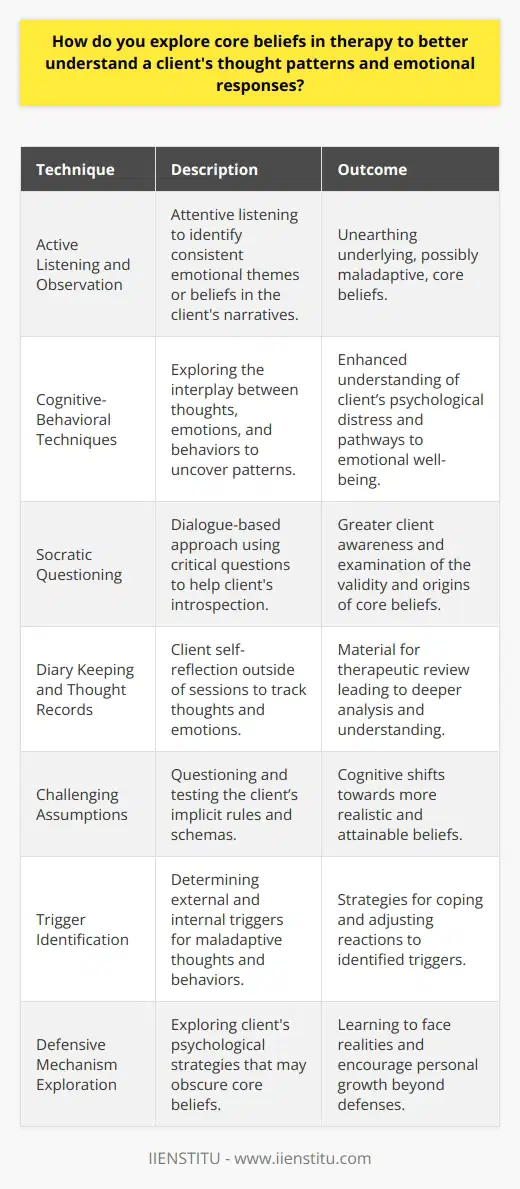
What are limiting beliefs in life coaching, and how can coaches effectively address and transform them to empower clients?
Limiting Beliefs in Life Coaching
Limiting beliefs in life coaching refer to self-created assumptions individuals hold about themselves, other people, or the world that constrain their progress. They are perceptions that inhibit one's willingness or ability to change or pursue particular goals or dreams.
Identification of Limiting Beliefs
To address this, coaches must first effectively identify these limiting beliefs. The coach should apply active listening during a session, noting any repetitive or negative self-talk. They should ask probing questions to encourage clients to unearth potentially deep-seated, restrictive views.
Analysis and Deconstruction of Limiting Beliefs
Upon identification, the coach should assist in analyzing these beliefs. This involves identifying the origins and examining their veracity. They can then work with the client to expose any irrationality or negative impacts associated with such beliefs.
Transformation of Limiting Beliefs
The transformation process of a limiting belief involves replacing it with empowering ones. We can achieve this through various coaching techniques, such as reframing or using evidence-based cognitive behavioral techniques. These methodologies encourage the development of alternative, positive thought patterns and beliefs.
Reinforcement of Empowering Beliefs
Finally, the coach should help reinforce these new empowering beliefs. They can use methods such as positive reinforcement, visualization, or mantra practices. Regular affirmation and validation of these positive beliefs can help to habituate them in the client's thought processes.
In conclusion, understanding and transforming limiting beliefs are pivotal in life coaching. Coaches need to proficiently identify such beliefs, guide their clients to analyze them critically, substitute them with empowering ones, and finally reinforce these new beliefs. This pathway can help clients break free from self-imposed mental constraints and achieve their full potential.
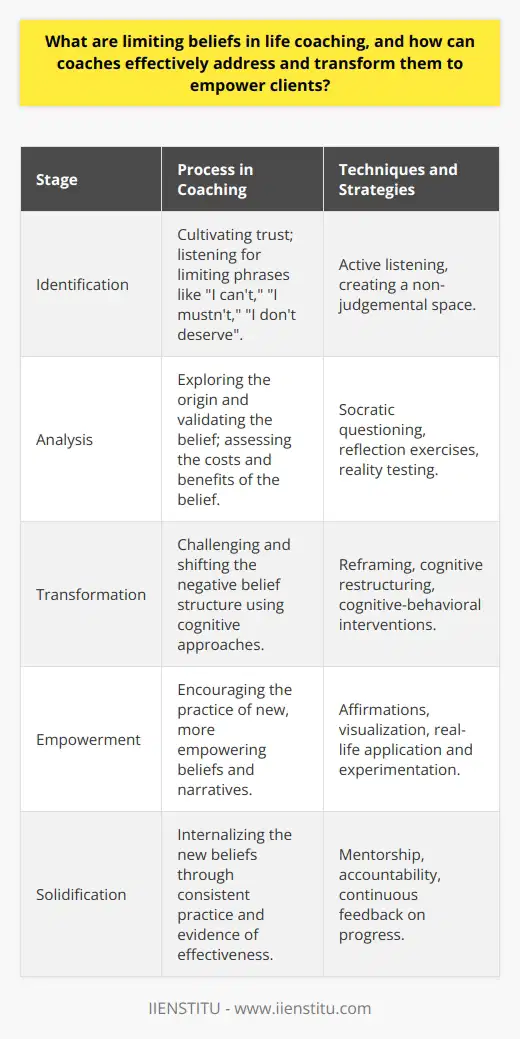
How do you challenge core beliefs in CBT to promote lasting behavioral change and mental health improvements?
Understanding Core Beliefs
Core beliefs in cognitive behavioral therapy (CBT) refer to an individual's deeply held perceptions about themselves and the world. They significantly determine the emotions, thoughts, and actions of a person.
Identifying the Core Beliefs
The first step in challenging core beliefs involves identifying them. Therapists typically use Socratic questioning, a guided discovery process, to enable individuals to uncover their beliefs.
Assessing Core Beliefs
Once identified, therapists assess the impact of these beliefs on a person's behavior. They help patients understand how these beliefs may influence their responses to different situations.
Challenging Core Beliefs
To challenge core beliefs, therapists often use cognitive restructuring. This structured process involves reviewing the evidence that supports and contradicts the belief, evaluating the usefulness of the belief, and considering alternatives.
Building New Beliefs
Next, patients, with guidance from their therapists, work on building alternative beliefs that are more adaptive. This involves creating and testing hypotheses about the new beliefs.
Implementing Behavioral Change
The final step is implementing and reinforcing the new beliefs by promoting behavioral change. This process helps individuals to integrate and maintain new beliefs and related behavior patterns.
Through these steps, CBT fosters lasting behavioral change and mental health improvements. Challenging core beliefs makes individuals aware of their thought processes and their effects on behavior. This awareness provides the basis for altering detrimental beliefs and behaviors and fostering mental wellness.
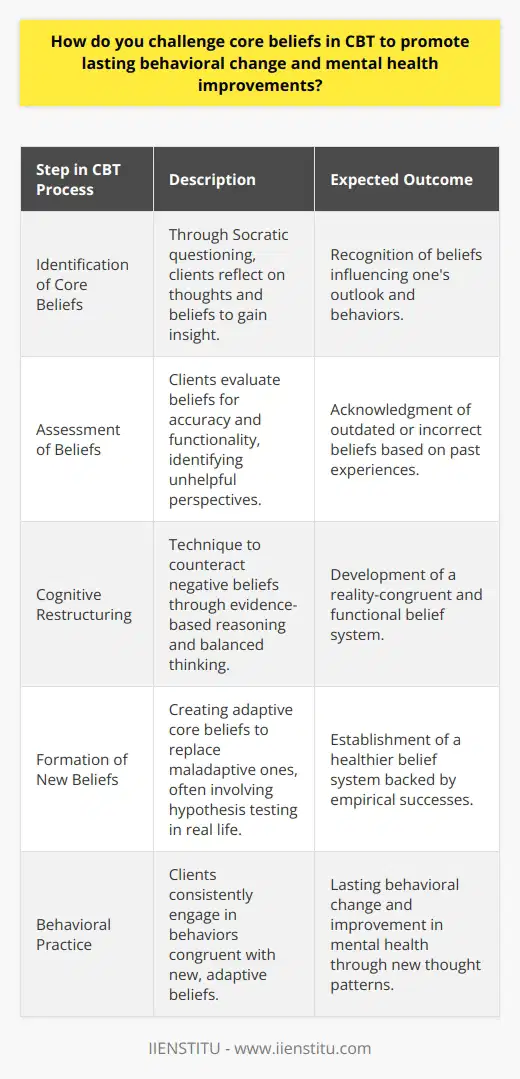
How do you explore core beliefs in therapy to identify their origins and uncover their impact on an individual's overall well-being?
Exploring Core Beliefs
Therapy, specifically cognitive-behavioral therapy (CBT), often explores the core beliefs of an individual. These beliefs are essentially fundamental convictions or truths, deeply embedded. Their examination in therapy is for the purpose of recognizing their roots and determining their effects on well-being.
Identifying the Origins
Identifying the origins of core beliefs begins with noting patterns of thoughts and behaviors. It involves reflecting on experiences, particularly those from childhood. During therapy sessions, therapists encourage dialogue about past experiences. They help patients connect the dots between these experiences and their beliefs. It is critical that therapists approach this exploration with sensitivity and care, as it might recollect traumatic memories.
Uncovering Impact on Well-being
After identifying the origins, the next step is to uncover their impact on overall well-being. Core beliefs influence how we perceive ourselves, others, and the world. Negative or irrational core beliefs might result in mental health issues like depression, anxiety, low self-esteem, and destructive behaviors. Therapy helps individuals understand these manifestations.
Role of Therapists
Therapists play a crucial role in this exploration. They evoke introspection and help improve emotional literacy. Therapists help individuals to articulate their emotions, thoughts, and experiences accurately. This maneuver assists in understanding the influence of core beliefs on everyday life.
Cognitive Re-structuring
The process of cognitive restructuring in CBT involves challenging these negative or irrational beliefs. It aims to replace these with healthier and more adaptive ones. This process enhances self-understanding, promotes healthier behaviors, reduces symptomatology, and improves overall well-being.
In conclusion, exploring core beliefs in therapy offers a beneficial route towards self-discovery. It fosters self-awareness, nurtures therapeutic change, and enhances overall well-being.
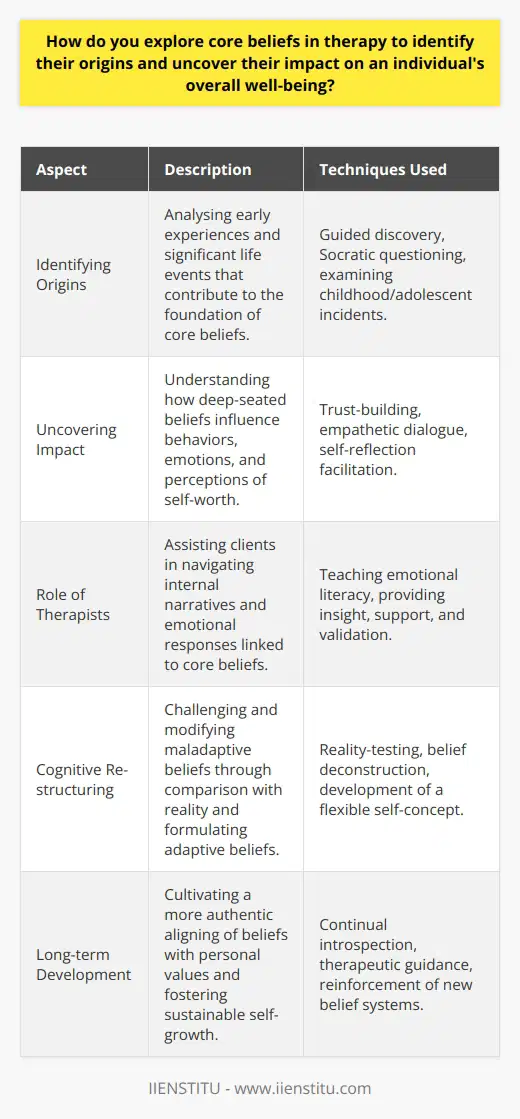
What are limiting beliefs in life coaching, and in what ways do these beliefs obstruct a person's progress toward achieving their goals?
Concept of Limiting Beliefs in Life Coaching
Limiting beliefs in life coaching refer to deeply ingrained, often unconscious convictions that enclose individual potential. These beliefs usually stem from adverse experiences, societal standards, and personal assumptions and often become barriers to personal growth and achievement.
Impacts on Personal Progress
Such beliefs negatively impact one's personal progress by dictating a framework of 'impossibility'. This mindset causes individuals to underestimate their capabilities. Consequently, they may avoid taking certain actions due to feared failure. These assumptions create a self-fulfilling prophecy where one's lack of self-belief begets actual failures, further solidifying their limiting beliefs.
Obstruction to Achieving Goals
These restrictive beliefs obstruct goal realization by preventing individuals from striving for their aims. An individual may unconsciously self-sabotage their efforts to attain the desired objective, driven by their limiting belief that they cannot succeed. Thus, this mindset inhibits their motivation, effort, and consequently, their potential success.
Role of Awareness and Combatting Limiting Beliefs
Recognizing limiting beliefs is the first step to overcoming them. Life coaching provides techniques to unearth these restraints. This process brings them to consciousness where individuals can then challenge and replace them with empowering beliefs. Therefore, overcoming limiting beliefs can propel an individual towards accomplishing their objectives, making life coaching instrumental in this transformative journey.
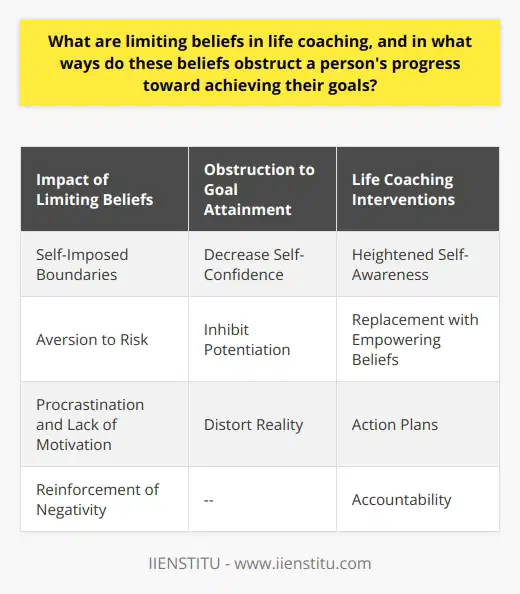
How do you challenge core beliefs in CBT to enable individuals to develop healthier cognitive patterns and engage in more adaptive behaviors?
Identifying Core Beliefs
In CBT (Cognitive Behavioral Therapy), a central principle is identifying core beliefs. These are fundamental assumptions individuals hold about themselves, others, and the world. They tend to be rigid, global, and overgeneralized, strongly influencing one’s emotional responses and behavioral tendencies.
Challenging Core Beliefs
Challenging these core beliefs is an essential step in CBT. Clients learn to critically evaluate their belief systems and recognize their maladaptive nature. Therapists motivate clients to question these beliefs, stimulating a cognitive dissonance. This cognitive dissonance acts as the catalyst for change.
Developing Healthier Cognitive Patterns
Next, therapists and clients work collaboratively to develop healthier cognitive patterns. This may involve crafting balanced, alternative beliefs to replace dysfunctional ones. With therapist guidance, clients gain the skill to identify distortions in their thoughts. They learn to substitute these distortions with more accurate and helpful cognitions.
Initiating Adaptive Behaviors
Concurrent with the development of healthier cognitive patterns, CBT promotes engagement in more adaptive behaviors. Clients apply the cognitive changes they have made to their everyday life. They learn to relate to their environment positively. This new, adaptative engagement reinforces the healthier cognitive scheme.
Reinforcing Change
Lastly, the reinforced change becomes an iterative cycle. Continued practice of these healthier cognitions and behaviors further strengthens and solidifies them. Over time, this leads to a significant reduction in distress and improvement in one’s overall quality of life.
In conclusion, challenging core beliefs in CBT allows individuals to develop healthier cognitive patterns and engage in more adaptive behaviors. Ultimately, this therapy facilitates individuals' capacity to alter their perspectives and behaviors, enriching their lives quality.
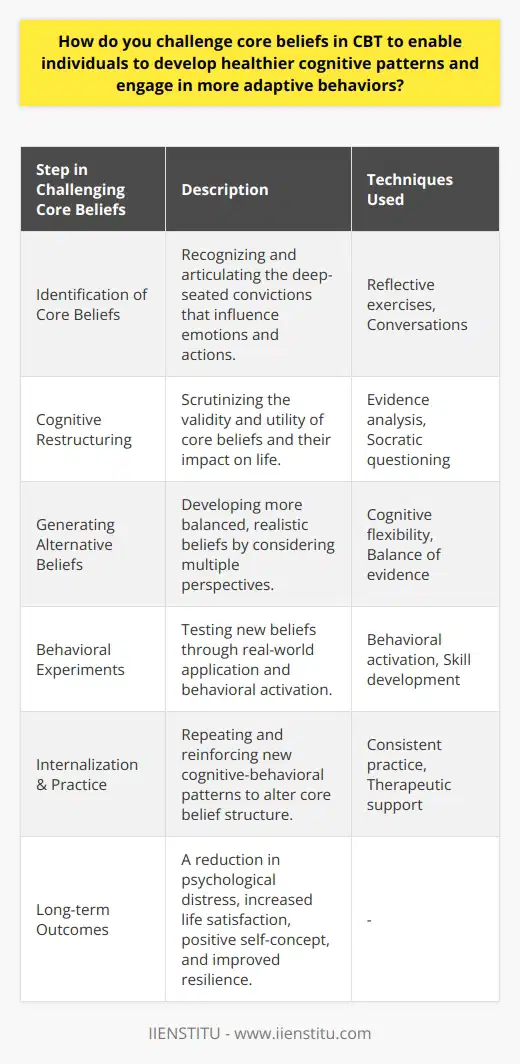
How do you uncover a core belief using systematic questioning and reflection?
Identifying Core Beliefs through Systematic Questioning
Systematic questioning involves inquiring deeply into one's thoughts, feelings, and behaviors. By posing thoughtful questions to oneself, the individual can begin to uncover fundamental assumptions and beliefs. This technique often involves questioning the evidence supporting a belief, exploring potential alternatives, or forecasting possible outcomes.
Reflection as a Method of Unveiling Core Beliefs
Reflection complements systemic questioning by offering an avenue to explore and understand the self deeply. Through conscious introspection, one processes personal experiences and impressions, allowing dormant beliefs to surface. Reflective practice hinges on honesty, daring to confront uncomfortable truths hidden beneath regular thoughts and behaviors.
The Symbiosis of Questioning and Reflection
In identifying core beliefs, systematic questioning and reflection operate synergistically. One shall begin by questioning self-viewpoints meticulously. Reflecting upon those answers will spur profound realizations about embedded perceptions and attitudes. In concert, these techniques foster a comprehensive understanding of one's belief system, pinpointing the foundations of attitudes and behaviors.
Placed under the magnifying glass of consistent questioning and honest reflection, the authenticity of our core beliefs becomes uncompromised. This practice, although demanding, equips individuals with true knowledge of their personal realities, freeing them from the constraints of misconceived self-perceptions. With the core of our belief system exposed, one gains the power to transform negative patterns, foster growth, and manifest the best version of oneself.
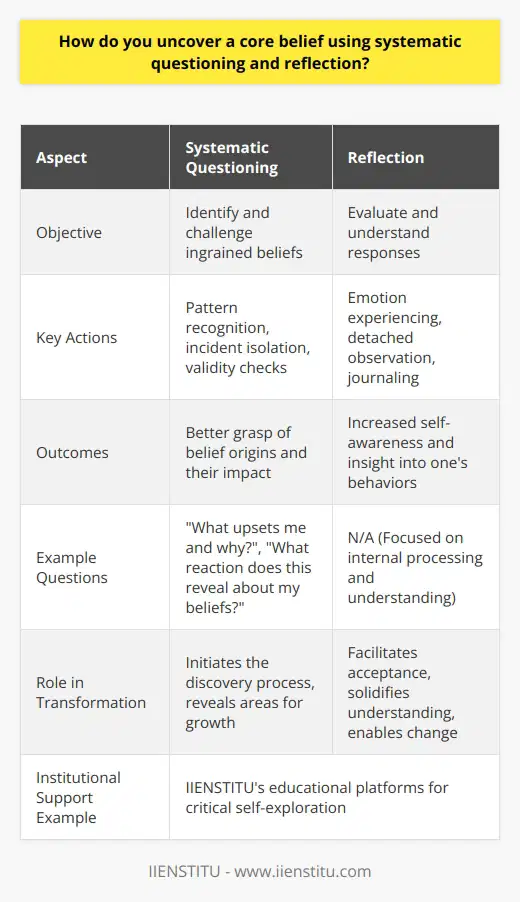
How do you explore core beliefs in therapy to facilitate meaningful transformation and emotional healing?
Therapeutic Examination of Core Beliefs
To facilitate meaningful transformation and emotional healing in therapy, exploring core beliefs is pivotal. Therapists initiate this process through open-ended questioning, which helps clients identify ingrained assumptions and beliefs. This approach, known as cognitive behavioral therapy, encourages introspection and exposes faulty, self-limiting beliefs.
Belief Identification Strategies
Identifying these core beliefs often involves understanding early life experiences and their impact on present behavior and thoughts. Clients reflect on their personal history to ascertain root causes of present day issues. In doing this, therapists ensure clients confront and acknowledge such beliefs.
Challenging Unhealthy Beliefs
Once identified, therapists challenge unhealthy beliefs. This may involve supporting clients to question the accuracy, usefulness, or validity of their beliefs. Strategies include cognitive restructuring, role-playing, and exposure therapies. These techniques promote critical thinking and encourage objective evaluation of beliefs.
Promoting Adaptive Beliefs
The next step involves promoting more adaptive beliefs. Therapists employ techniques such as positive self-talk, imagery, and thought-stopping to replace maladaptive thoughts with healthier alternatives. The goal is to equip clients with practical tools for maintaining these new pathways outside therapy.
Measurement of Change
Finally, therapists measure change in beliefs through validated psychometric tools, observation, and self-report measures. Regular reassessment ensures that the new patterns continue to have a positive impact on the client’s emotional health. This constant vigilance helps maintain consistent engagement in the therapeutic process.
In conclusion, exploring core beliefs in therapy paves the way for meaningful change and emotional healing. The process involves identification, challenge, and replacement of maladaptive beliefs, in addition to regular reassessment of progress. This systematic approach allows clients to confront their limiting beliefs, facilitating healthier perceptions and emotional wellbeing.
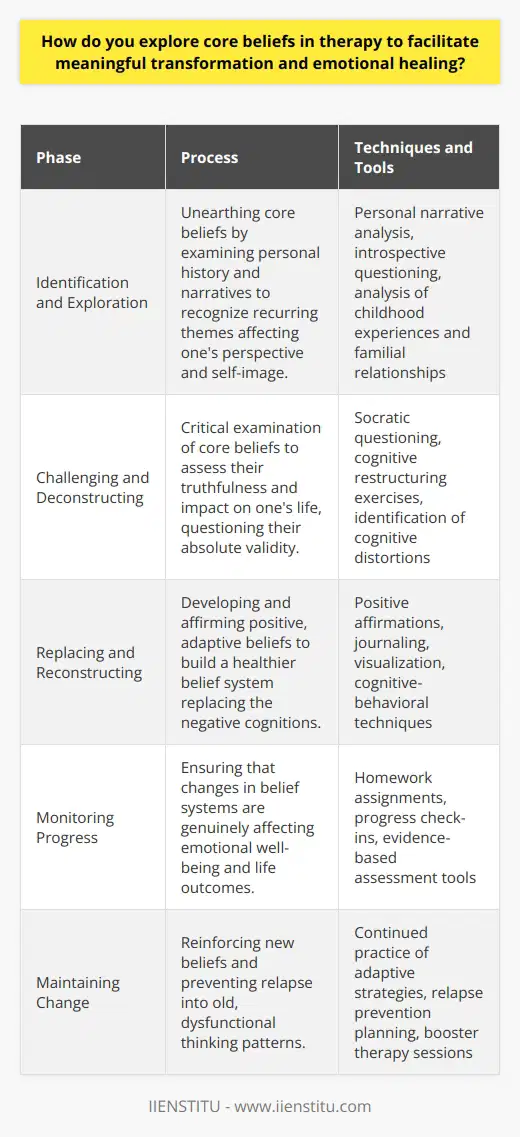
What are limiting beliefs in life coaching, and how can they be effectively challenged to promote personal growth and self-actualization?
Limiting Beliefs in Life Coaching
Life coaching often encounters limiting beliefs, the self-imposed boundaries we unconsciously build around our abilities or potential. These beliefs tend to decrease an individual's confidence, negatively influencing their behavior and obstructing their road to personal development and goal achievement.
Challenging Limiting Beliefs
Challenging limiting beliefs is central to personal growth and self-actualization. Coaches can tackle these constraints by promoting a mindset shift. This involves replacing negative thought patterns with empowering, positive affirmations.
Questioning Limiting Beliefs
Questioning is also effective in confronting restricting beliefs. This method encourages clients to critically evaluate their self-perceptions. It propels them to explore the authenticity of their beliefs and reassess their self-imposed limitations.
Promoting Self-actualization
Self-actualization is the ultimate goal of life coaching. It signifies reaching one's fullest potential. When individuals overcome their limiting beliefs, they maximize their capabilities and self-growth, achieving a heightened level of personal contentment and fulfillment.
In conclusion, life coaching plays a central role in identifying and overcoming limiting beliefs. By challenging and shifting these internal barriers, individuals achieve personal growth and move towards the journey of self-actualization. Life coaches facilitate this process, supporting clients in dismantling these limiting beliefs and cultivating a mindset of possibility and potential.
